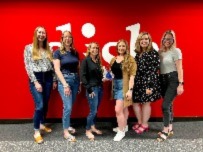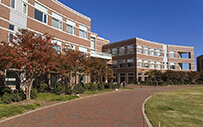
Third in a series of articles focused on the candidate experience, this article by Mary Scott addresses how execution, authenticity, and the candidate experience shape the employer’s campus brand.

By measuring employment brand strength, companies can identify areas to improve their employer brand, pinpoint strengths to leverage, and assess the effectiveness of their recruitment strategies, ultimately aiming to attract the best candidates and reduce hiring costs.

Although new college graduates looking to enter the workforce and employers hiring these graduates agree on which competencies are most important for job candidates to hone, their perception of student proficiency in them differs.

In 2021, Hope College’s Boerigter Center for Calling and Career partnered with several computer science majors to develop a custom, interactive application for the college’s students and visitors to see a visual representation of the locations of Hope alumni around the world and their jobs. It also shows current job and internship openings in a given city.

The large-employer winner of the 2023 NACE Award for Recruiting Excellence, DISH’s “Recruit Once, Hire Twice” college recruiting process brings in top interns and works to convert them into full-time hires.

Diversity and inclusion have traditionally been about race and about sex, but we are all so much more than just what is visible, explains author, speaker, and social impact adviser Michele Sullivan.

There are key steps that employers and colleges can take to ensure that their culture is inclusive, such as providing training, planning intentionally, and holding employees accountable, says MarTeze Hammonds, Ed.D.

Several years ago, Vanguard did away with giving out swag at career fairs. Instead, as part of the sign-in process at its table, Vanguard allows students the option to choose between three charitable organizations for the company to make a donation to on the student’s behalf.

Launched in 2018 with a flagship two-day immersive conference, Workday’s “Future Females in Tech Engagement Program” helps women to build career confidence and make the connections they need to get started in the tech industry.

The UC Berkeley Career Center’s annual transfer student career summit is a five-hour virtual event that was created to help connect transfer students, who are often overwhelmed when navigating career opportunities, and employers that are not aware of the value transfer students can bring to organizations.

University of Idaho Career Services created the “Career Services Internship Certificate Program” approximately five years ago to give undergraduate interns the knowledge, skills, and abilities to transition to the professional workforce.

An employer looking to set up a “campus champion” program as an element in its campus recruiting efforts turned to colleagues in the NACE Community for ideas on staffing, the responsibilities and expectations of the program, and the guidelines for campus engagement.

How do you get more students to attend your career fairs? Career services staff often brainstorm new ways to get more students in the door—and NACE members are sharing their latest ideas.

NACE Community members share ideas for keeping interns who have accepted their job offers interested and excited until the first day of employment.

The Center for Career Development at the University of Charleston is working to engage employers by transforming transactions into relationships.

Career services practitioners offer ideas for approaches that add form, function, or fun to helping students perfect their elevator pitches.

The career center’s name should reflect the services it offers to students, and help them identify it as a career development and job-search resource.

Career services professionals urge students to include a professional picture with their LinkedIn profile, but what about on their resumes?

An inclusive work culture mirrors the community the organization serves and yields many benefits for both the organization and its employees.

There is a disconnect between students’ use of employer websites and their perception of the usefulness of those sites. Here’s why and how to fix it.

The KU Engineering Career Center’s social media takeover program is especially important now, when employers are unable to engage students in person.

The University of Georgia Career Center has facilitated more than 20 employer Instagram takeovers this semester.

Some career centers are seeking ideas for appreciation gifts that are unique, useful, and cost-effective that can be handed out to recruiters during on-campus events.

Dr. Julia Overton-Healy of St. John Fisher College suggests career services offices need to recalibrate their understanding of who their students are and make changes to accommodate them.

Last fall, VCU began offering its Interdisciplinary Career Readiness Skills minor, an 18-credit pathway for students to develop today’s most highly sought-after job skills.

New graduates and their potential employers can agree on which skills are most important for job candidates, but differ on how proficient new graduates are in those abilities.

Cigna recently held a virtual event to increase awareness of HBCUs and spotlight the prominence and legacy of HBCUs in the Black community.

NACE members share their ideas for fun, useful items that career centers can give to students during career fairs.